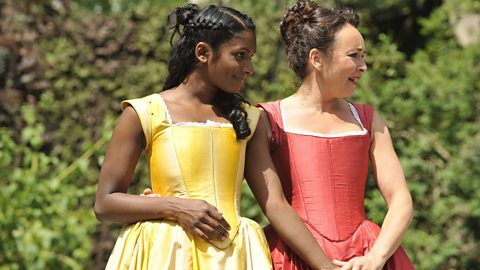Hero in Much Ado About Nothing

Hero and Beatrice are contrasting characters
Hero is the innocent and obedient daughter of Leonato. She contrasts with the more outspoken and independent Beatrice and presents a conventional image of a suitable and desirable wife.
Claudio describes her as a 'jewel' when he first meets her and praises her for being 'modest'. He accuses her on their wedding day of being unfaithful, and she faints. The Friar advises her father to pretend she is dead, to give her a chance of a life.
At the end of the play, when Claudio has seen the error of his accusations, Hero is given to him as a wife, in disguise as Antonio's daughter.
| How is Hero like this? | Evidence | Analysis | |
| Beautiful | Hero is so beautiful that Claudio falls in love with her at first sight. | "In mine eye she is the sweetest lady that ever I looked on." (Act 1 Scene 1) | Claudio praises Hero for her beauty. She is also admired by Don Pedro and is often referred to as 'fair Hero'. |
| Obedient | Beatrice tells Antonio that her cousin always does what her father asks. | "Yes, faith; it is my cousin's duty to make curtsy and say 'Father, as it please you." (Act 2 Scene 1) | We learn from about Hero from the things that other characters say. Here Beatrice highlights how dutiful her cousin can be. She uses the words "duty", "curtsy" and "please" to emphasise Hero's obedient nature. |
| Quiet | In comparison to Beatrice, Hero doesn't say much at all in the play. | "I talk'd with no man at that hour, my lord." (Act 4 Scene 1) | When Claudio accuses her of being with another man, he uses elaborate language. However, Hero responds with simple, quiet truth. |
| Forgiving | Even though Claudio humiliates her at the altar, Hero is prepared to give him a second chance. | "And when I lived, I was your other wife: / And when you loved, you were my other husband." (Act 5 Scene 4) | She reveals herself to Claudio at the second wedding. Her speech is straightforward and lacking in blame or resentment. |
| Beautiful | |
|---|---|
| How is Hero like this? | Hero is so beautiful that Claudio falls in love with her at first sight. |
| Evidence | "In mine eye she is the sweetest lady that ever I looked on." (Act 1 Scene 1) |
| Analysis | Claudio praises Hero for her beauty. She is also admired by Don Pedro and is often referred to as 'fair Hero'. |
| Obedient | |
|---|---|
| How is Hero like this? | Beatrice tells Antonio that her cousin always does what her father asks. |
| Evidence | "Yes, faith; it is my cousin's duty to make curtsy and say 'Father, as it please you." (Act 2 Scene 1) |
| Analysis | We learn from about Hero from the things that other characters say. Here Beatrice highlights how dutiful her cousin can be. She uses the words "duty", "curtsy" and "please" to emphasise Hero's obedient nature. |
| Quiet | |
|---|---|
| How is Hero like this? | In comparison to Beatrice, Hero doesn't say much at all in the play. |
| Evidence | "I talk'd with no man at that hour, my lord." (Act 4 Scene 1) |
| Analysis | When Claudio accuses her of being with another man, he uses elaborate language. However, Hero responds with simple, quiet truth. |
| Forgiving | |
|---|---|
| How is Hero like this? | Even though Claudio humiliates her at the altar, Hero is prepared to give him a second chance. |
| Evidence | "And when I lived, I was your other wife: / And when you loved, you were my other husband." (Act 5 Scene 4) |
| Analysis | She reveals herself to Claudio at the second wedding. Her speech is straightforward and lacking in blame or resentment. |